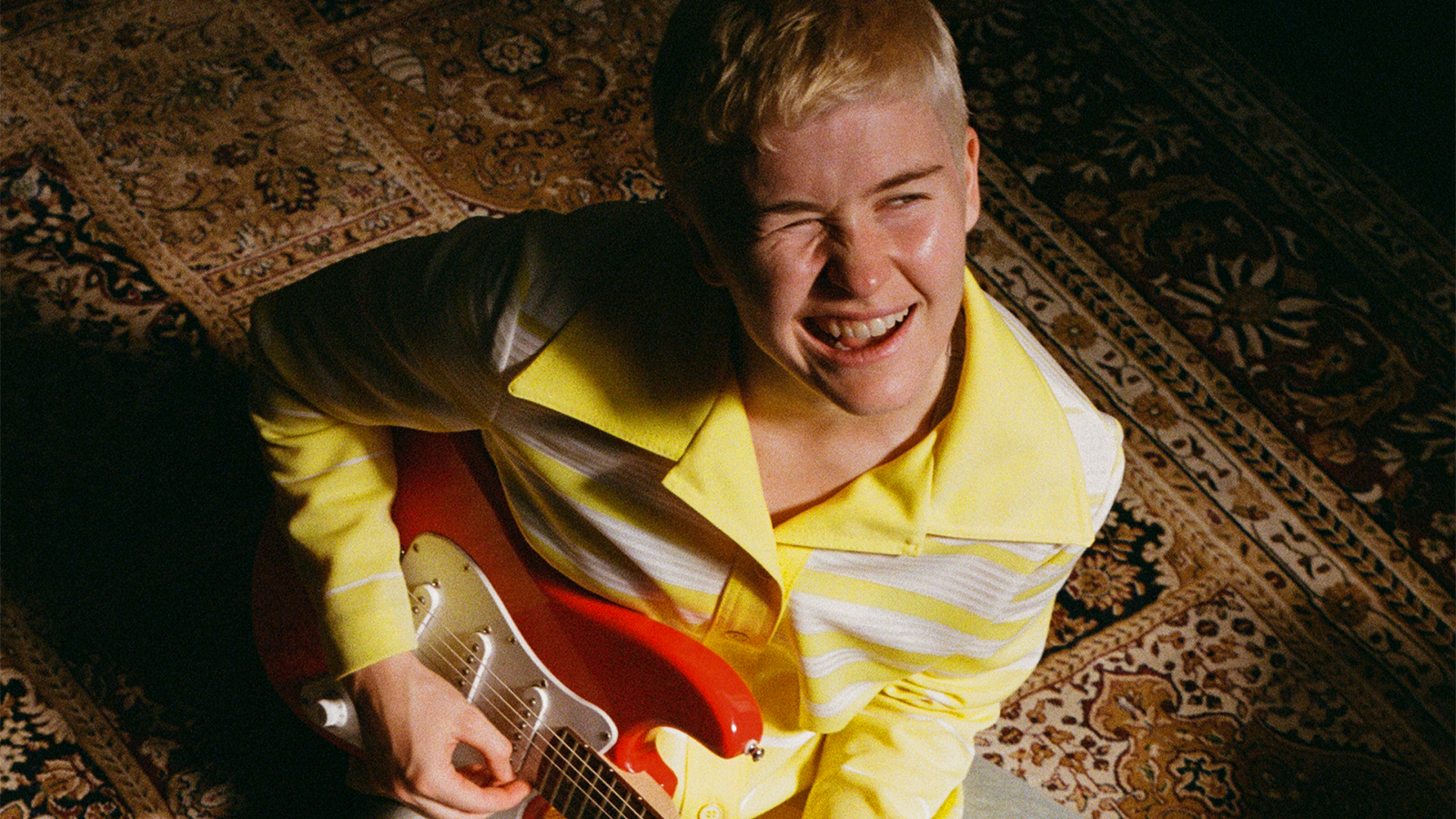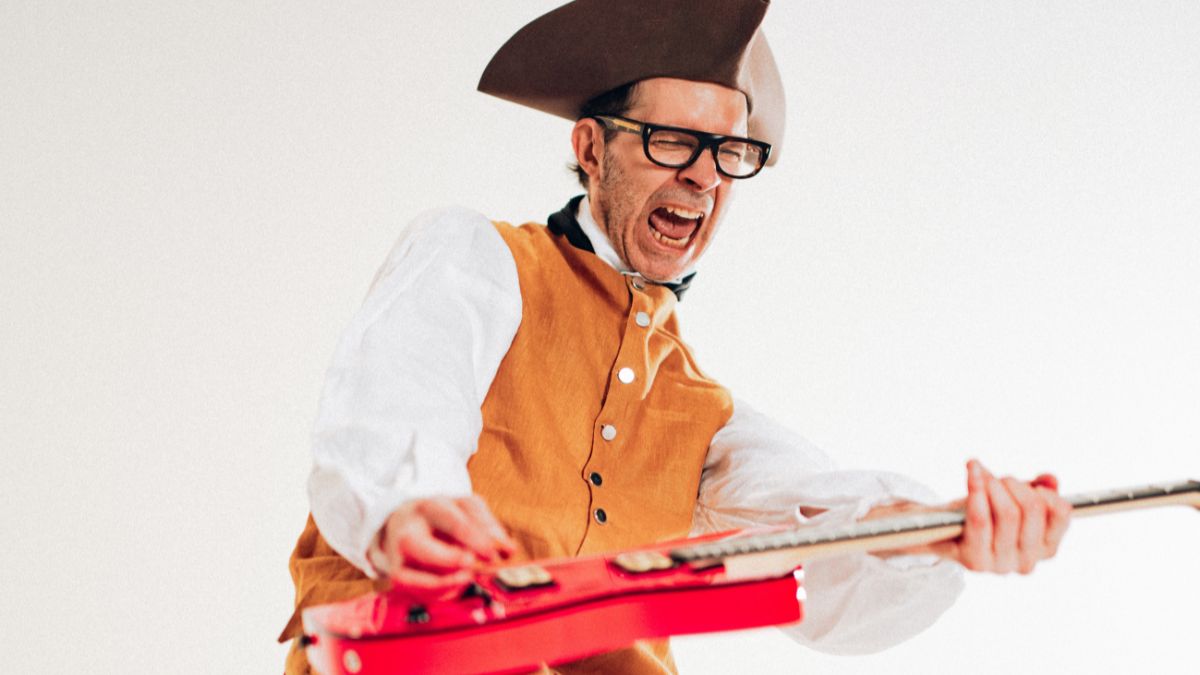Alex The Astronaut: “I feel like I’ve developed a lot as an artist, and that’s really, really exciting”
Alex The Astronaut walks us through the colourful chaos of her second album, How To Grow A Sunflower Underwater

All the latest guitar news, interviews, lessons, reviews, deals and more, direct to your inbox!
You are now subscribed
Your newsletter sign-up was successful
It was a weird time in the world, to say the very least, when Alexandra Lynn released her first album as Alex The Astronaut, The Theory Of Absolutely Nothing, in August 2020. We’ve since begun to regain some sense of normalcy – however fractured it may be – but Lynn’s personal journey over the past two years certainly wasn’t one she took down straight and/or clear paths. Her second album, How To Grow A Sunflower Underwater, commits to memory the route that she took, with all of its potholes and puddles intact.
The record sounds nothing short of magical, with strings, horns, synths and sound effects flourishing widescreen soundscapes pillared by warming folk melodies and cool indie-rock beats. You’ll melt into its transcendental grasp before the lyrics start to make sense, and when they do, you’ll be welcomed to an entirely separate world of colour and calamity. In it, Lynn explores themes of personal growth and self-reflection, reckoning with trauma, embracing vulnerability, taking stock of the past and powering on into the future.
Ahead of its release later this month, Lynn sat down with Australian Guitar to explain how she brought this cinematic explosion of emotion to life.
Do you feel like you’ve grown up as a person in tandem with your artistic evolution, in that both sort of inform each other?
Yeah, definitely. When I started being a career musician, I’d only just finished uni, I didn’t really know anything about that world. Like I loved writing songs, and I’d played some shows, but I really just went into it headfirst, and it took a few years for me to understand everything. I didn’t know anything about recording, or gear, or travelling, or any of that stuff. But I feel like I’ve built up a lot of those skills, and things are really opening up now. I feel like I’ve developed a lot as an artist [with this album], and that’s really, really exciting.
After putting out Theory and going on the journey you did with that album, did you feel more galvanised in your confidence when it came to building up the narratives on this one?
I have no idea, to be honest. I just write songs about what’s happening to me, and I’ve had quite a fair few things happen in the last four years. I think that was the difference: when I was doing the first record, I was travelling and putting songs together – I’d never written an album before, so I didn’t really know what I was doing – but the second album was a bit more intentional. I’d had all of these events happen, and they gave me a bit of a theme, I guess. Maybe that galvanised the narrative a little bit more.
There’s a lot of rawness and vulnerability on Sunflower, but I think ultimately, it feels more triumphant than anything. Was that a concerted effort, to balance the heaviness with a sense of buoyancy?
Definitely. That’s how I’ve always approached songs – I don’t want to take people to a dark place and just leave them there and say, “Good luck!” I think it’s really important to kind of sandwich these themes with... not ‘false hope’, but a sense of grandeur or catharsis. A big influence for this record was the Gang Of Youths albums, and how they’ve built these songs around really traumatic events that happened to [frontman Dave Le’aupepe], but when you listen to them, you only feel the triumph that came after it.
All the latest guitar news, interviews, lessons, reviews, deals and more, direct to your inbox!
I mean, sometimes you need a thesaurus to even understand what [Gang Of Youths’ songs] mean – but even when you don’t understand what they mean, the expressive nature of their arrangements mean that they get across whatever emotion they’re putting into it. That’s what I took from those influences – I added in a lot of string elements and horns, and all of those kinds of things, to make it feel really cathartic. [When you listen to the album] you’re not just stuck on the lyrics, which a lot of the time are quite intense.
What was it like having a much broader palette of tones to play with on this record, as opposed to Theory?
It was so exciting! I recorded with Sam [Cromack, vocals/guitar], Dean [Hanson, guitar/bass] and Dan [Hanson, drums] from Ball Park Music, and then my band – Vlada [Edirippulige, bass], Luke [Pallier, guitar/keys] and Kaleah [Scanlon, drums] – all in the room together. Sometimes we’d do it in shifts, with different people coming in and out of the sessions. And so I had kind of built up a relationship with my band, but then also with the Ball Park people. We’d had the songs for a little while – because of all the border closures and lockdowns, we got delayed like five times, so whenever we actually got into the studio, it was just so exciting.
I’d come in with a demo, and Sam would be like, “Okay, what one are we working on today?” We’d play the demo at the start, but I also had a playlist of influences, so we would go through a few of them, and then we’d kind of work out a game plan from there. We’d try to get through a song a day, and most of the time we did. The really exciting part was that we had two drummers, Dan and Kaleah, then Dean, Sam and Luke playing the guitar, Sam and Luke playing keyboards, and Vlada playing bass, so we had all of these musicians adding different elements to it.
I spent a lot of time on those influences, trying to figure out which bits from them needed to be included. Sometimes it was like, “Okay, this is a very Bruce Springsteen-y song.” There was a lot of Phoebe Bridgers, too. I think ‘South London’ is one where it was an equal split between those two. ‘Haunted’ was a lot more Phoebe. But it was a lot of troubleshooting at the start, and some of the songs were harder than others. ‘Growing Up’ took a really long time, and I was really nervous about that. I think we had to start it again at one point – and the same with ‘Haircut’. You need to listen to everything like 50,000 times a day, so by the end of the day, you’re kind of like, “Is this something, or is this shit?”
At the end of [most days in the studio], we’d send all the tracks off to Daniel [Chae, composer] and Miro [Mackie, engineer], who we worked with in the US. They did ‘Something Good’ over the internet, which was really cool, but once I did that song with them… The strings and horns that they do are just next level, so I was like, “We have to send them everything.” Daniel plays all the instruments himself, it takes him like an hour. And so by the time we got to the morning after we’d made a demo, we basically had a full orchestra on it.
I’ve never had that, with the palette thing – I mean, some of the songs sound like we’ve done them in $100,000 studios, but they were all just made over the internet. To hear it all come together now, it just makes me really proud. All these textural elements that we got to play with, and all those new things that I’d never worked with before… That’s been the most exciting part about [making] this album.

Ellie Robinson is an Australian writer, editor and dog enthusiast with a keen ear for pop-rock and a keen tongue for actual Pop Rocks. Her bylines include music rag staples like NME, BLUNT, Mixdown and, of course, Australian Guitar (where she also serves as Editor-at-Large), but also less expected fare like TV Soap and Snowboarding Australia. Her go-to guitar is a Fender Player Tele, which, controversially, she only picked up after she'd joined the team at Australian Guitar. Before then, Ellie was a keyboardist – thankfully, the AG crew helped her see the light…
